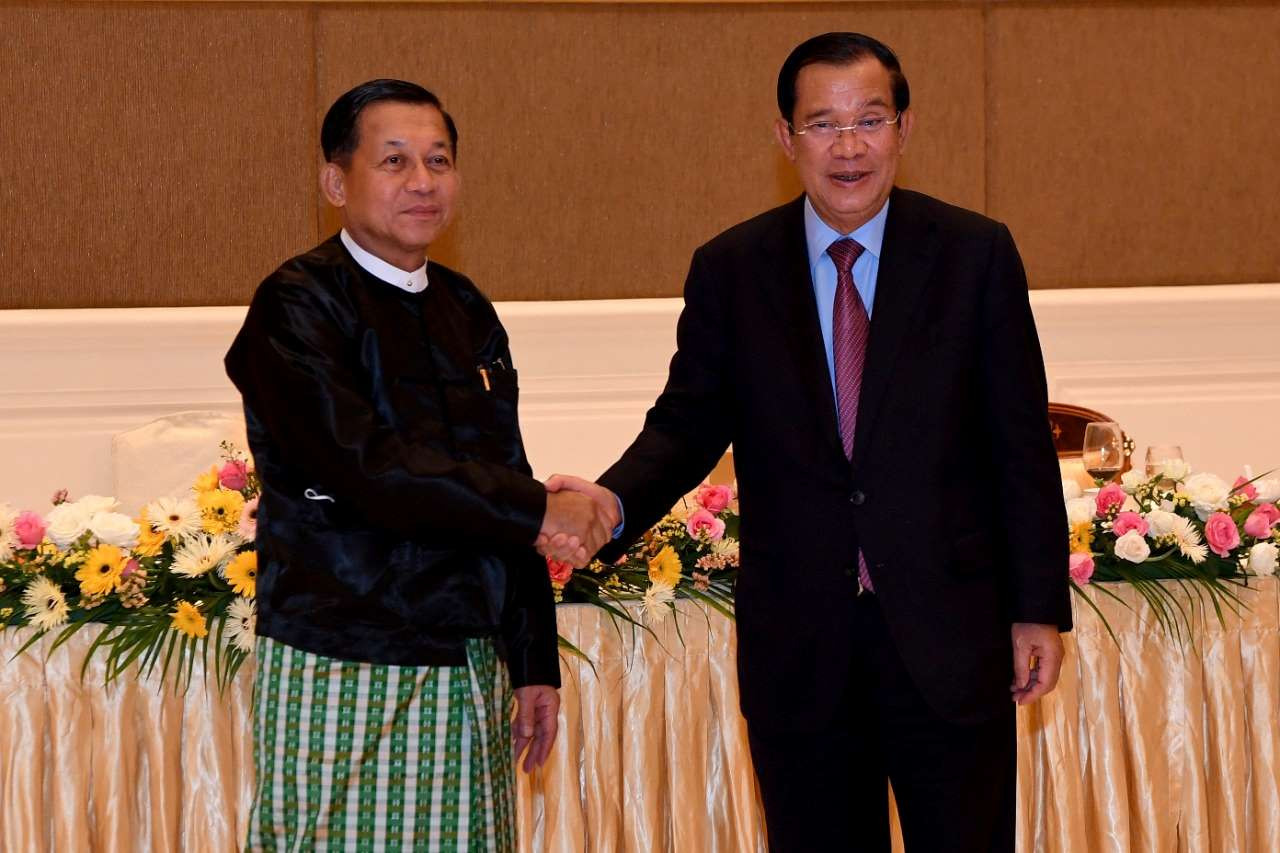Popular Reads
Top Results
Can't find what you're looking for?
View all search resultsPopular Reads
Top Results
Can't find what you're looking for?
View all search resultsThe ‘normalization’ of the junta’s rule In Myanmar?
The visit of Hun Sen, and its outcomes, raised a lot of questions regarding the ability of ASEAN to stay united in trying to resolve the problem of Myanmar.
Change text size
Gift Premium Articles
to Anyone
T
he recent visit by Cambodia’s Prime Minister Hun Sen to Myanmar has attracted much criticism from both within Myanmar and from other members of ASEAN. Contrary to the self-proclaimed “success” by both Hun Sen and the junta leader Gen. Min Aung Hlaing, the visit has not changed the harsh reality on the ground.
In fact, while Hun Sen was in Myanmar, violence perpetrated by the Myanmar military continued and led to civilian casualties. After Hun Sen returned to Cambodia, the junta even sentenced Aung San Suu Kyi to another four years of imprisonment.
Indeed, there has been no indication whatsoever that the junta will take serious steps to implement ASEAN’s five-point consensus (FPC). In fact, the visit was used by the military junta to create an impression of legitimacy and acceptance conferred by the ASEAN chair.
The joint press release on the visit clearly refers to Min Aung Hlaing as “Prime Minister of the Republic of the Union of Myanmar.” Hun Sen was also of the view that the junta should be included in ASEAN meetings, including in future summits, and he would work toward that end.
The visit, and its outcomes, raised a lot of questions regarding the ability of ASEAN to remain united in trying to resolve the problem of Myanmar. Hun Sen was reminded before and after the visit that the FPC should be a starting point for ASEAN’s approach to Myanmar.
Before the visit, President Joko “Jokowi” Widodo clearly told Hun Sen that ASEAN must stick to the FPC to bring democracy back in Myanmar. As this position might have been compromised, differences among ASEAN member states began to appear.
Immediately after the visit, there was an announcement that a foreign ministers retreat was postponed indefinitely.
Malaysian Foreign Minister Saifuddin Abdullah clearly expressed his disappointment at the visit and said that “there are people who think that he should not have made the visit because his visit has been construed as some recognition to the military junta of Myanmar.”
Prime Minister Lee Hsien Loong of Singapore told Hun Sen that ASEAN must maintain the policy of inviting only nonpolitical representatives of Myanmar because there had been no significant progress on the ground. In other words, Cambodia forgot that the Myanmar problem cannot be resolved through a unilateral approach. It is an ASEAN problem and should be resolved together by ASEAN.
Indeed, Indonesia, Malaysia and Singapore are right to insist that ASEAN’s position on this issue should be maintained. The FPC needs to be implemented as a sensible pathway to peace in Myanmar. And, the decision by ASEAN leaders that Myanmar can only be represented by nonpolitical representatives, unless progress is made on the ground, should not be taken lightly by any member state.
Any step that deviates from, or runs counter to, the FPC could lead to the “normalization” of the junta’s rule in Myanmar. It is true that ASEAN should engage all parties in Myanmar if it wants to resolve the problem. However, engagement should not be equated with “normalization” where ASEAN begins to accept the brutal reality on the ground.
Some analysts and former diplomats in certain countries like to see themselves as “realists” and have begun to advocate that ASEAN engages in this normalization of the military junta’s rule in Myanmar.
Cambodia should understand that being the chairman of ASEAN does not give it a privilege to do whatever it wants. As the Malaysian foreign minister said, in ASEAN, consultation is important. Indonesia, as the largest member of ASEAN and often recognized as a natural leader of ASEAN, cannot always get other members to agree with it. It is hard to understand why Cambodia thinks that it can ignore other member states and go it alone.
However, ASEAN should also appreciate Cambodia for trying. Now, as the junta has once again displayed its recalcitrance, ASEAN must focus on what has been lacking so far, namely the absence of a coherent plan on how the FPC should be implemented, and how ASEAN should work with dialogue partners to resolve this difficult problem.
Otherwise, when Indonesia takes over the chairmanship in 2023, we will inevitably go back to where we started. If we continue to go in circles like this, the normalization of the junta’s rule in Myanmar will be reinforced at the expense of the ordinary people of Myanmar.
***
The writer is a senior fellow at the Centre for Strategic and International Studies, Jakarta, and former ambassador to the United Kingdom, Ireland, and the International Maritime Organization (2016-2020).










